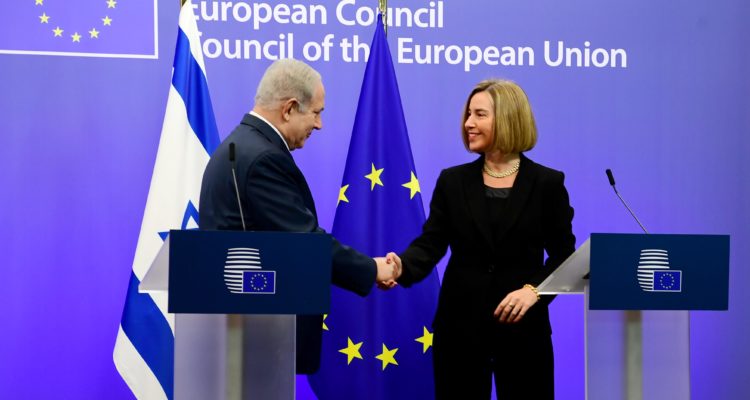The Israeli prime minister emphasized Israel’s role in keeping Europe safe, its burgeoning private sector economic partnerships, and the prospects for peace after the US declaration recognizing Jerusalem as Israel’s capital.
By: Batya Jerenberg, World Israel News
Prime Minister Benjamin Netanyahu met Monday with 28 EU foreign ministers in a breakfast get-together in Brussels, Belgium. This is the first time in over two decades that a sitting prime minister has been asked to address such a gathering – made possible by the invitation issued by Lithuania, which holds the current presidency of the EU.
Netanyahu was welcomed by EU foreign policy chief Federica Mogherini, and they spoke about the major points that each would be making later in the morning.
The Israeli prime minister hit on themes that have become familiar in the wake of President Donald Trump’s announcement recognizing Jerusalem as Israel’s capital.
He stressed that Israel is one of Europe’s protectors in the “common battle” they share against terrorism, insisting, “Israel is the strongest power in the Middle East that is preventing the spread of militant Islam, not only preventing ISIS attacks in Europe, but also preventing the collapse of many parts of the Middle East adjacent to Israel that would otherwise be taken over by these militant Islamists, driving many, many, many millions into Europe.”
Netanyahu: Israel will bring prosperity to Europe
Israel will also bring Europe more prosperity, he said, through the global technological revolution that the Jewish state is spearheading in the fields of health, automobiles/transportation, and cyber security. Netanyahu also mentioned the current exploration of a potential gas pipeline from Israel’s offshore gas fields up to Italy, via Cyprus and Greece, which would be “very important for Europe’s economy.”
Referring to the Trump announcement, Netanyahu was very clear that he considers it a new opportunity to renew negotiations, because “what President Trump has done is put facts squarely on the table…. Peace is based on recognizing reality, and I think the fact that Jerusalem is Israel’s capital is clearly evident to all of you who visit Israel…. It doesn’t obviate peace; it makes peace possible, because recognizing reality is the substance of peace, it’s the foundation of it,” he stated.
He ended on an optimistic note, sharing his belief that “all, or most of the European countries will move their embassies to Jerusalem, recognize Jerusalem as Israel’s capital, and engage robustly with us for security, prosperity and peace.”
Mogherini, for her part, condemned the recent violent attacks on Israel and Jews in other countries, especially the stabbing Tuesday of a security guard at Jerusalem’s Central Bus Station by a 24-year-old Palestinian.
EU policy on Jerusalem
However, she reiterated the European bloc’s policy of recognizing the “international consensus” on Jerusalem, meaning that it should be a shared capital between the Palestinians and Israelis. She also stated that the EU was firmly committed to a two-state solution and that the EU would step up its own efforts to bring the two sides together. In that context, she said that the bloc’s representatives will hold talks with Palestinian President Mahmoud Abbas next month.
At the meeting itself, the foreign ministers also heard Netanyahu’s oft-repeated warning regarding the danger to the region, and not only Israel, of Iran becoming entrenched in Syria. He responded to foreign ministers’ questions on “settlements” by saying that he does not believe that the Jewish communities in Judea and Samaria are at the heart of the conflict, citing areas where Arabs and Israelis live side by side, such as Jaffa, Acre and Haifa.




